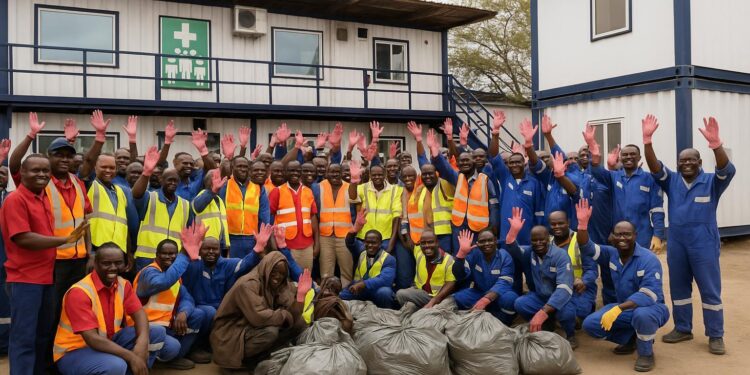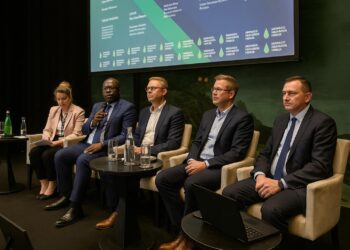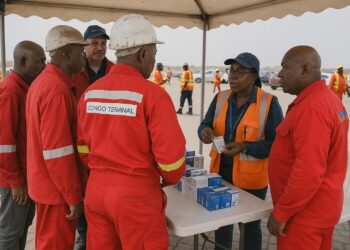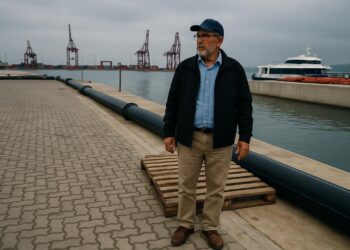A record one-day sweep in the Pointe-Noire corridor
On 20 September 2025, 150 employees of Africa Global Logistics Congo fanned out across a logistics compound near Pointe-Noire, filling sacks with plastic, scrap metal and paper. By dusk, 40,000 square metres—roughly the size of six football pitches—had been cleared of waste.
World Cleanup Day reaches Congolese ports
World Cleanup Day, launched in Estonia in 2008 and now observed in 190 countries, encourages citizens to remove litter from public spaces. This year’s edition gave Congolese logistics hubs a stage to align with the global movement and demonstrate practical commitments to environmental stewardship.
Zero-waste pledge from the corporate frontline
“Our objective is zero waste, and we deploy every available lever to keep our workplaces clean,” stated Raïssa Dekambi, Head of CSR at Africa Global Logistics Congo. She highlighted that the initiative falls under the group’s broader environmental policy aimed at embedding eco-responsibility across operations.
Why a clean platform matters for supply-chain resilience
Logistics platforms handle bulk cargo, containers and project equipment. Debris left on aprons can puncture tyres, corrode machinery and slow throughput. By removing waste, the company lowers operational risk, enhances safety metrics and ensures faster cargo rotation—factors closely tracked by insurers and financiers.
Employee mobilisation turns policy into practice
Participation was voluntary but widely embraced. Teams organised in shifts, each supplied with gloves, rakes and bins. Managers report that the hands-on exercise boosted morale and sharpened awareness of waste-sorting procedures that will now be applied daily on the docks.
From one day to year-round ESG monitoring
Africa Global Logistics Congo plans monthly spot checks to maintain the cleared perimeter. Internal dashboards will track kilograms of waste collected, share of materials recycled and the number of staff trained. Such data feed into the parent group’s annual sustainability report audited by third parties.
Regulatory backdrop supports private efforts
The Republic of Congo’s 2022 law on environmental protection requires firms to limit industrial pollution and submit waste-management plans. Port authorities have echoed these obligations through concession agreements, making concrete cleanups a prerequisite for licence renewals and tariff incentives.
Alignment with national climate objectives
Brazzaville’s updated Nationally Determined Contribution targets a 20 % cut in greenhouse-gas emissions by 2030. While logistics emissions largely stem from fuel combustion, systematic waste reduction helps curb methane leaks from uncontrolled dumps and signals responsible conduct to multilateral lenders supporting green corridors.
Investor lens: translating clean yards into capital access
Global infrastructure funds increasingly screen African assets against ESG benchmarks. By documenting the cleanup and its follow-up protocols, Africa Global Logistics Congo strengthens its case for competitive borrowing rates, eligibility for blended-finance envelopes and stronger positions in forthcoming public-private partnerships.
Supply-chain partners react positively
Shipping lines, trucking cooperatives and warehouse operators expressed support. One subcontractor manager noted that tidier loading zones cut vehicle turnaround time by ten minutes on busy days, potentially saving thousands of litres of diesel annually.
Educational ripple effects beyond the fence
Employees carried the message home, organising mini cleanups in nearby neighbourhoods the following weekend. Local schools requested workshops on waste sorting, demonstrating how corporate actions can seed broader community change without formal outreach budgets.
Lessons for peers in Central African logistics
Regional operators watching the Congolese experience may replicate the model. Key takeaways include early purchase of protective material, clear mapping of litter hotspots and public recognition to maintain momentum.
Maintaining neutrality and operational focus
Management emphasised that the initiative was primarily operational, not a publicity stunt. By integrating environmental performance into key performance indicators normally reserved for throughput, the company aims to normalise sustainability rather than treat it as an occasional add-on.
Challenges on the path to scale
Achieving zero waste across a multi-site network entails negotiating with diverse subcontractors and ensuring consistent waste-collection services in peri-urban zones. The company is assessing compacting machines and digital tracking to manage volumes more efficiently.
Government-business synergy gains momentum
Officials from the Ministry of Environment welcomed the cleanup, citing it as evidence that voluntary corporate action complements public waste-collection programmes. Talks are under way to formalise joint monitoring frameworks for key industrial zones.
Potential carbon-credit dimension
Although the current exercise focuses on solid waste, executives are studying the Congolese carbon market guidelines to explore whether certified reductions could generate credits. If viable, future cleanups might finance themselves while advancing the country’s climate diplomacy.
Looking ahead to World Cleanup Day 2026
Preparatory committees are already mapping areas beyond the logistics zone, including coastal stretches where marine debris threatens fisheries. The 2026 target is to engage 500 volunteers and document a 25 % rise in recyclable material recovered.
A model of pragmatic sustainability in motion
The 40,000 m² sweep shows how clear metrics, staff ownership and regulatory alignment can convert abstract ESG pledges into measurable outcomes. For investors eyeing Central African corridors, such evidence of disciplined execution may weigh as heavily as throughput figures or tariff structures.












































